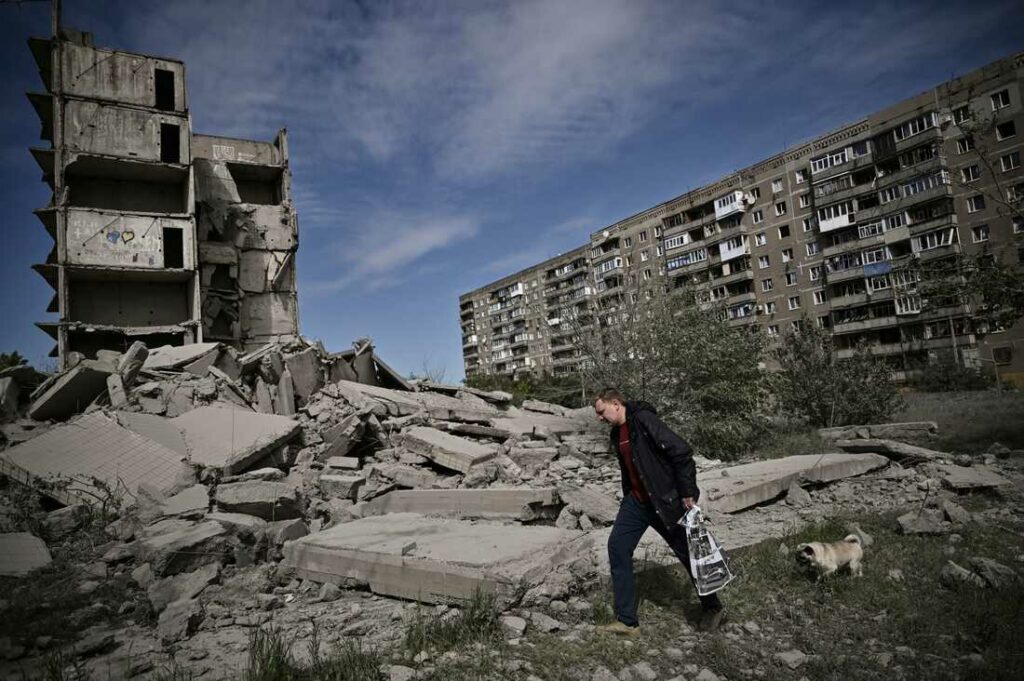Manas Dasgupta
NEW DELHI, May 28: The strategic Ukrainian town of Lyman in eastern Ukraine, on the road to two key Ukrainian cities, has finally fallen to Russia. The Russian army on Saturday confirmed what the separatist forces had claimed on Friday that Moscow has finally taken control of Lyman.
“Following the joint actions of the units of the militia of the Donetsk People’s Republic and the Russian armed forces, the town of Lyman has been entirely liberated from Ukrainian nationalists,” the defence ministry said in a statement, confirming an announcement a day earlier by pro-Moscow separatists.
Pro-Russian separatists from the self-proclaimed Donetsk People’s Republic had said on Friday that they had fully captured the town, a railway hub west of Sievierodonetsk. Russia had earlier captured the strategic port city of Mariupol.
Even as it captured Lyman, the Russian President Vladimir Putin on Saturday warned the leaders of Germany and France against ramping up arms supplies to Ukraine, saying they could further destabilise the situation in the pro-Western country.
Putin told French President Emmanuel Macron and German Chancellor Olaf Scholz that the continuing arms supplies to Ukraine were “dangerous”, warning “of the risks of further destabilisation of the situation and aggravation of the humanitarian crisis,” the Kremlin said.
Russian forces also announced on Saturday a latest successful test of their Zircon hypersonic cruise missile as Moscow steps up its Ukraine offensive. The missile was fired from the Admiral Gorshkov frigate stationed in the Barents Sea and “successfully hit” a target stationed 1,000 kilometres away in the White Sea in the Arctic, the defence ministry said. The ministry added the test was undertaken as part of ongoing “testing of new weapons.”
Ukraine also confirmed the Russia claim of capturing Lyman. Ukraine said Russia had captured most of Lyman but that its forces were blocking an advance to Sloviansk, a city 20 kilometres southwest. The two forces had been fighting for Lyman for the last several days. Russia said it had used missile strikes to destroy Ukrainian command posts in Bakhmut and Soledar. Both towns lie on a strategically important road running southwest from Lysychansk and Sievierodonetsk, where the main Russian offensive is now concentrated.
The ministry also said it had destroyed five command and observation posts, hit areas where Ukrainian soldiers and equipment were located and destroyed four ammunition depots near the towns of Nyrkove, Bakhmut and Myronivka.
Russian forces turned their focus to the Donbas region after running into fierce Ukrainian resistance in other parts of the country and abandoning an assault on Kyiv. Russia says it is waging a “special military operation” to demilitarise the country and rid it of nationalists threatening Russian-speakers there. Kyiv and Western countries say Russia’s claims are a false pretext to attack the country.
Earlier on Saturday, the Ukrainian presidential adviser and peace talks negotiator Mykhailo Podolyak had said any agreement with Russia could not be trusted and Moscow can only be stopped in its invasion by force. “Any agreement with Russia isn’t worth a broken penny,” Podolyak wrote on the Telegram messaging app. “Is it possible to negotiate with a country that always lies cynically and propagandistically?”
Russia and Ukraine have blamed each other after peace talks stalled, with the last known face-to-face negotiations on March 29. The Kremlin said earlier this month Ukraine was showing no willingness to continue peace talks, while officials in Kyiv blamed Russia for the lack of progress.
The first official Zircon test, which President Vladimir Putin described as a “great event,” came in October 2020. Other tests followed, from the same frigate and from a submerged submarine. The latest test of a hypersonic weapon comes as Russia looks to be making ground in its offensive launched in Ukraine in late February.
The weapon can reach speeds of between five and ten times the speed of sound and has a maximum range of around 1,000 kilometres. In March, Moscow said it had used for the first time in combat its high-precision Kinzhal, or dagger, hypersonic missile. Putin has described the missiles as a family of new “invincible” arms in Russia’s arsenal.
The new generation-weaponry, unveiled by Putin in 2018, are more difficult to track and intercept by missile defence systems than conventional weapons, owing to their speed but also as they are launched at lower altitude towards their target.

